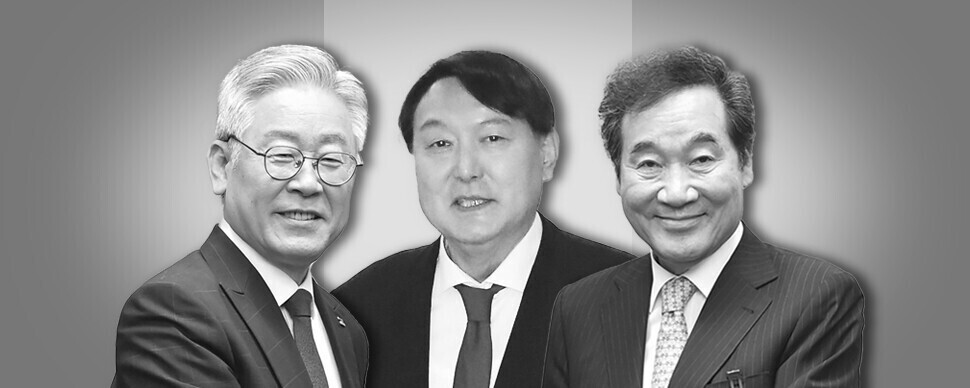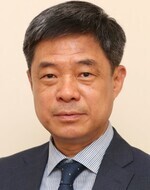hankyoreh
Links to other country sites 다른 나라 사이트 링크
[Column] We mustn't allow a foreign policy amateur to become president

A few years ago, I was taken aback to see Seoul mayor Park Won-soon riding a bus around the city while sitting next to a "comfort woman" statue. That came very natural for Park, who had served as a prosecutor in the international war crimes tribunal on the issue of the comfort women (who served as sex slaves for Japan's imperial military machine), but, for some reason, it didn't seem to fit Park's status as mayor of Seoul, a major global city.
It seemed to me that the leader of a nonprofit and the mayor of Seoul ought to take different approaches, even if they're pursuing the same goal. Despite being a highly qualified leader, I got the impression that Park was less surefooted about diplomacy.
A similar flippancy can be seen in the likely candidates for next year's presidential election as they gear up for their campaigns. They're engaging in a myopic and anachronistic debate about issues of history and foreign policy that could determine the country's fate.
The recent debate over history and Japan was sparked by Gyeonggi Province Gov. Lee Jae-myung's remark about American "occupying forces," but the red-baiting response of former prosecutor general Yoon Seok-youl and other conservative candidates added fuel to the flames.
When Yoon decried "forces who deny the legitimacy of the Republic of Korea," he seemed to be saying that anyone who refers to the US military as "occupying forces" isn't a normal Korean citizen. That's comparable to the attitude of the national security establishment in the 1980s and 1990s, which regarded "Perceptions of Korea's Liberation Period" as a Communist screed.
When Yoon resorted to rhetoric about "looters," "a cartel of vested interests," and "a wicked administration," I assumed he'd adopted a strategy of playing to his base — namely, the supporters of the main opposition People Power Party.
But as time goes by, I've learned that Yoon was actually speaking from the heart. In short, he's a hardcore conservative, an "old-style" conservative, without any potential for appealing to moderates.
There are few signs of any foreign policy vision in Yoon. About the only thing he said about foreign policy while announcing his presidential bid was that he would "reveal the true identity of the Republic of Korea [. . .] a country that does its duty and shares values with the international community."
Yoon is essentially calling into question the values and identity of the Moon administration. That's a ridiculous tactic for a country that was just invited to attend the Group of Seven summit.
Yoon's remarks about South Korea-Japan relations are also worrisome. He's factually wrong when he claims that the Moon administration's anti-Japanese sentiment ruined relations with Japan or that South Korea hasn't made a big deal about Japan releasing radioactive water from Fukushima in the past. He also seems to think rather simplistically that taking the opposite approach of President Moon Jae-in would fix relations with Japan.
In reality, South Korea must balance a variety of factors, some domestic and some foreign, in its relationship with Japan.
It's highly dangerous for the opposition party's frontrunner in the presidential election to have so little in the way of foreign policy capability or vision. Foreign policy is a highly challenging act of state that requires a balancing act between vision and reality. It's absurd to expect that from Yoon, who spent 27 years as a public prosecutor.
There are also concerns about Lee Jae-myung, governor of Gyeonggi Province. Even if his remark about the US "occupying forces" is basically true to history, that doesn't make it appropriate.
Lee said that he was voicing his regret about the failure to fully reckon with the legacy of Japanese collaboration while visiting the Yi Yuksa Memorial Hall, but he could have expressed that sentiment with more delicacy.
That said, accusing Lee of denying the legitimacy of the Republic of Korea — as if Lee were saying the Republic should never have been born — is a gross misinterpretation of his remarks. It's a historical fact that the Republic of Korea's roots go back to the US occupying forces, Rhee Syngman, and Japanese collaborators. There's no need to be glum about that — or to take pride in it, for that matter.
With the passage of time, we've corrected some of the mistakes of the past and moved toward facing the facts that need to be faced. It's incumbent upon us to look plainly upon our historical limitations and achievements in subsequent years.
A bigger problem is Lee Jae-myung's suggestion that Korean should boycott the Olympics because Japan labeled Dokdo (called "Takeshima" in Japan) on its maps. The Dokdo issue isn't one that we should approach emotionally.
The beauty of sports is fair play, and there's no need to drag in national disputes. Even if Lee wanted to take issue with the Dokdo labeling, he shouldn't have talked about a boycott.
The fundamental cause of the deterioration of South Korea-Japan relations is the return of the Japanese far-right, but South Korean leaders have exacerbated the problem with their vacillation. Former president Lee Myung-bak stirred the pot with his visit to Dokdo, and former president Park Geun-hye made things worse by blowing hot and cold.
Nor am I inclined to give the Moon administration a high score for its hardline diplomacy against Japan in its first few years. It should have been more centered yet flexible in its action.
One of the five planks in the platform that Lee Nak-yon, former head of the Democratic Party, outlined when he announced his candidacy was "a new diplomacy based on soft power." Lee's promise to cooperate as much as possible with Japan and Russia suggests that he means to maximize Korea's diplomatic resources.
When political leaders fail to achieve balance on foreign policy and ethnic issues, it leaves the country vulnerable to every crisis. The fact is that it's hard to find a balanced historical attitude or a centered foreign policy among the leading presidential candidates.
It would be a misfortune for Korea if our next president has no capacity for foreign policy. If we're to weather the rough waves that are crashing on our nation and our history, we mustn't allow a foreign policy amateur to become president.

By Back Ki-chul, executive editor
Please direct comments or questions to [english@hani.co.kr]

Editorial・opinion
![[Editorial] Penalties for airing allegations against Korea’s first lady endanger free press [Editorial] Penalties for airing allegations against Korea’s first lady endanger free press](https://flexible.img.hani.co.kr/flexible/normal/500/300/imgdb/original/2024/0502/1817146398095106.jpg) [Editorial] Penalties for airing allegations against Korea’s first lady endanger free press
[Editorial] Penalties for airing allegations against Korea’s first lady endanger free press![[Editorial] Yoon must halt procurement of SM-3 interceptor missiles [Editorial] Yoon must halt procurement of SM-3 interceptor missiles](https://flexible.img.hani.co.kr/flexible/normal/500/300/imgdb/child/2024/0501/17145495551605_1717145495195344.jpg) [Editorial] Yoon must halt procurement of SM-3 interceptor missiles
[Editorial] Yoon must halt procurement of SM-3 interceptor missiles- [Guest essay] Maybe Korea’s rapid population decline is an opportunity, not a crisis
- [Column] Can Yoon steer diplomacy with Russia, China back on track?
- [Column] Season 2 of special prosecutor probe may be coming to Korea soon
- [Column] Park Geun-hye déjà vu in Yoon Suk-yeol
- [Editorial] New weight of N. Korea’s nuclear threats makes dialogue all the more urgent
- [Guest essay] The real reason Korea’s new right wants to dub Rhee a founding father
- [Column] ‘Choson’: Is it time we start referring to N. Korea in its own terms?
- [Editorial] Japan’s rewriting of history with Korea has gone too far
Most viewed articles
- 1Months and months of overdue wages are pushing migrant workers in Korea into debt
- 2[Editorial] Penalties for airing allegations against Korea’s first lady endanger free press
- 3Trump asks why US would defend Korea, hints at hiking Seoul’s defense cost burden
- 4Bills for Itaewon crush inquiry, special counsel probe into Marine’s death pass National Assembly
- 560% of young Koreans see no need to have kids after marriage
- 6Korean firms cut costs, work overtime amid global economic uncertainties
- 7[Guest essay] Maybe Korea’s rapid population decline is an opportunity, not a crisis
- 81 in 3 S. Korean security experts support nuclear armament, CSIS finds
- 9S. Korea discusses participation in defense development with AUKUS alliance
- 10[Reporter’s notebook] In Min’s world, she’s the artist — and NewJeans is her art